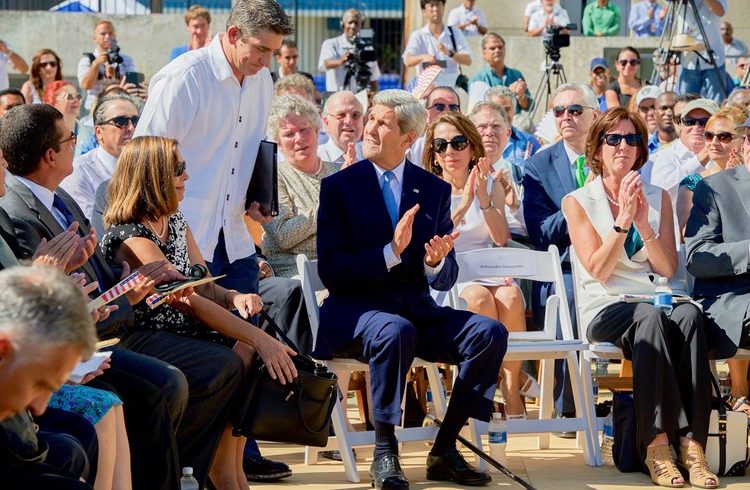Physically, Richard Blanco could easily pass for Cuban in the streets of Havana, where he’d be just another man in his forties who has aged well, good looking, having the genes of Spanish immigrants from a not too distant generation. He would pass for Cuban even after opening his mouth, because he speaks Spanish with a Cuban accent, and is capable of the most perfect “Que vola, asere?!” or any other local slang phrase.
But when the conversation is about literature –he told me when we were discussing the best way to conduct this interview that he kindly granted OnCuba— he prefers to do it in English because the Spanish he learned at home wouldn’t suffice to talk about more elevated things.
“As I always like to say, I was made in Cuba, assembled in Spain and imported to the United States,” he said, and I realized that Ambassador Jeffrey DeLaurentis was quoting him when he introduced him to the audience that heard him recite his inaugural poem at the opening ceremony of the U.S. Embassy in Havana on August 14.
His parents, both Cuban, left for Spain in 1967 to get to the United States –there were no direct flights at the time— when his mother was seven months pregnant, so he was born in Madrid. Shortly after, the family continued on to New York, and eventually ended up settling in Miami.
“I as look back in my life,” he said, “it’s sort of a foreshadowing of the things I would obsess in my writing about: home, place, and identity. By the time I was 45 days old, I belonged to three countries, I had lived in two world-class cities, and I had been named after President Richard Nixon, so there was a lot going on by the time I was born.”
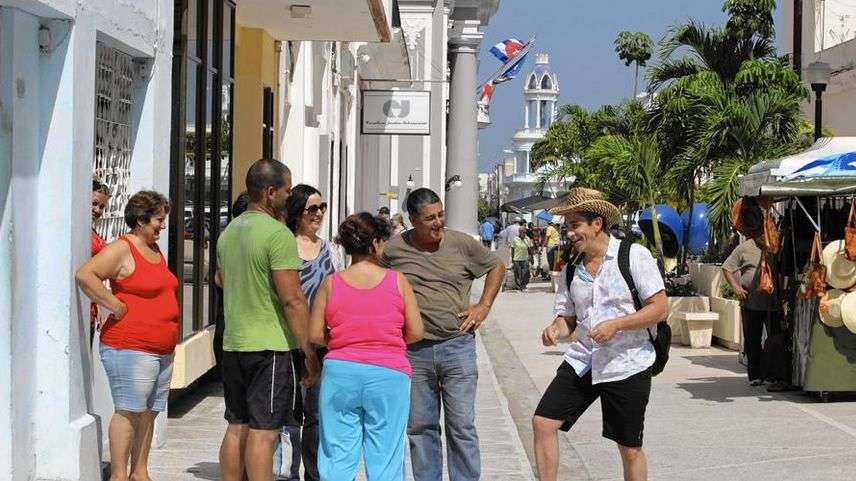
Growing Up in Miami
Richard’s memories growing up in Miami are no different from those of any other son of exiles, for whom Cuba was but a recurrent mythical issue –only, in his case, articulated from the perspective of an engineer who has a way with words.
His mother had grown up in a dirt floor home in a town in Cienfuegos, a province 140 miles east of Havana. The youngest of eight brothers and sisters, she managed to get herself an education and graduate from the University of Santa Clara. As sometimes happens with parents who had to work hard for their own education, the Blancos made sure that the son had a private education.
They supported him all the way through college, until he graduated in 1991 from Florida International University as a Civil Engineer.
“My parents always told us that there was this place where we were from, but that they left because they knew there was a better life for us in the United States. So, in some way, ours was an American dream story,” he said. “But there was always the sense that we were going back somehow. It was not an explicit thing that they would say, but there was always the sense in the household that there was this paradise, this place, this homeland, and we could go back someday, though we were not sure when, of course. Throughout the years that feeling was less and less.”
Richard says that, in addition to the common stories about the Cuban past, there was also a lot of protective silence: “Even though our parents told us some things, they also tried to protect us a lot. They were not too politically charged, but they held back a lot of the pain they had felt, as well as stories I’m still finding out about. They didn’t want us to carry some of the longing and the anger they had felt.”
As other teenagers like him, he had to deal with his parents’ contradictory wishes: “On the one hand, they wanted us to be cubanos, but also wanted us to be American, get a good job, and live the American dream… So there was always a fine balance, which was a little confusing when you were a kid.
“When you didn’t want to eat arroz con pollo they would be like: “Ah, Está hecho un Americaaaano…!” (Look at him, he´s all American now!), but at the same time they wanted you to go to some great American school, so that would send mixed messages.”
For youngsters like him, the border separating Miami from the rest of the United States was the limit of a world still unknown. “That’s what was weird about growing up in Miami: there was another paradise, another sort of mythical homeland, which was America. In Miami I grew up surrounded by a complete Cuban community, so I thought that that America I saw on TV was where everybody else in America lived.
“That is what we were negotiating as children of exiles: it’s trying to think about that Cuba that we were from, and trying to think about this supposed America where we were living in now, but looked nothing like what you were seeing on TV.”
When asked what his parents had taught him about Cuban culture, he replies that many of those efforts used to hit the wall of rejection raised by the rebel that every child becomes.
“Certainly, every case is different, but there is an initial rejection of your culture because it’s your parents’, and whatever your parents do is going to be tacky: if they’re dancing salsa you want to dance rock ‘n roll; if they speak English, that embarrasses you because they speak with an accent…
“But as you grow older, you realize that these stories that you would overhear while the men were playing dominoes weren’t only stories, but that there really was a place called Cuba, and that they had really lived there. Then, in your early 20s, you ask that question that we all ask ourselves: ´Where am I from?´ That was the process and I think it’s similar for many of us: you fall in love with that Cuban culture of your parents when you have the maturity to grow into it. It’s a cultural coming of age.”
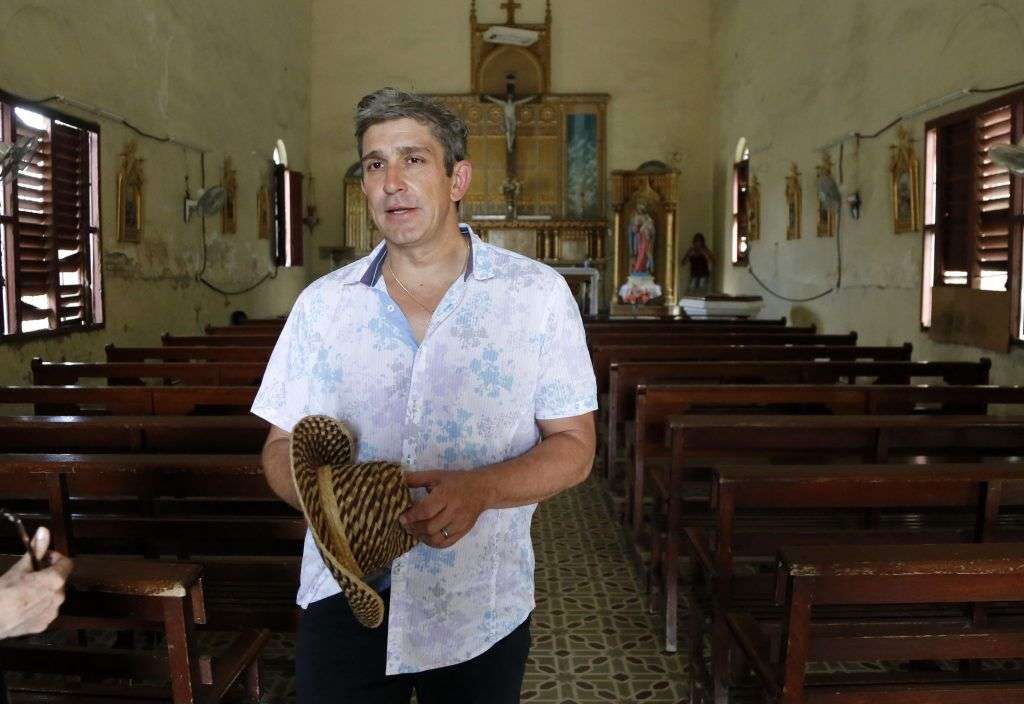
Visiting Cuba
The question of his identity was the beginning of Richard’s career as an author. He set out on a trip to Cuba in 1994 and started to pull out old letters and pictures from memory boxes kept by his mother, which he had ignored before.
“My mother was worried when I made that trip,” he recalled, “but I didn’t see anything terribly bad. To me it was like stepping into a story. Imagine someone has been telling you a story all your life, and then you are in the book, and you get to see the pages, and the characters, and the landscapes and the book talks… It was an amazing experience. I filled in so many blanks and answered so many questions about what it is I’m from.
“And then I came back for different reasons. This is my seventh trip to Cuba. Things are always a little different here: you learn about a new relative, a new story. I think it was around my second or third trip that my family here started to get on my nerves, until one day I told one of them: “¡Ay, José, cállate!” (“For Christ’s sake, Jose, shut up”) and that’s when I thought: “Finally, they’re family”.
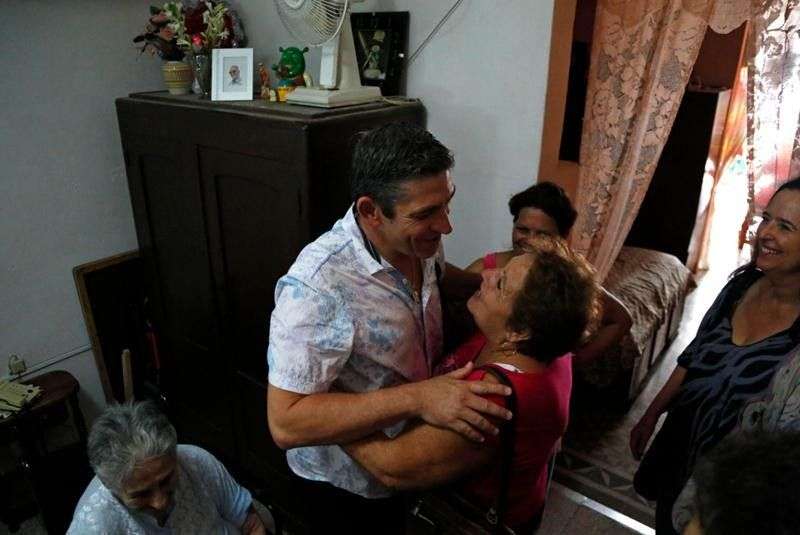
Orphan Literature
I ask him if his poetry has been influenced by Cuban and Latin American writers and he answers that their presence in his work is more emotional than literary.
“That’s not to say that I haven’t been inspired by Marti, Neruda or Garcia Marquez,” he said, “but I was educated in English and, at the end of the day, I am not a Latin American poet, I am an American poet. I intersperse my writing with Spanish a lot as a reflection of what biculturalism is, but I am not necessarily completely bilingual. The connection with Cuba is more about diving into people, into their minds, in my role as an emotional historian, interested in what my parents and other people went through and felt.”
“So of course I’ve looked more towards the English authors, because of an aesthetic that matches more closely how I can deliver things. Elizabeth Bishop is probably one of my greatest influences, not just aesthetically, but also because she was orphaned when she was very young. In her, I read the same longing felt from exile like that of anybody in my family. I think that, psychologically, she was in the same quest that I was, I saw in her that same absence of home that I saw in my parents. I look for authors who have that kind of theme in their writing, whether it’s things about home, or place and belonging, or identity. In America there’s a whole plethora: Latino authors, of course, but there’s also Native American and African American authors.”
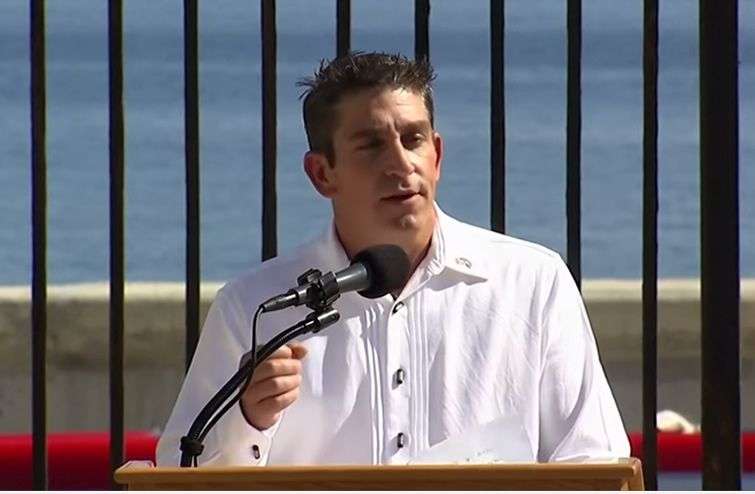
The Embassy Poem
“Matters of the sea”, now also known as “the embassy poem,” started to be planned out at a meeting Blanco held with current Ambassador DeLaurentis and former USINT Public Affairs Officer Lynn Roche in June.
According to Richard, one of the first sources of inspiration for the poem was something he heard from his friend Ruth Behar, who later translated the poem into Spanish. “In Cuba,” she told him one day over dinner, “regardless all our history, no one is the other”.
In the poem the sea is a symbol of the relation between the United States and Cuba, it is, at the same time, the enormousness of what separates and unites the two countries. “It’s the cliché of the 90 miles separating us, which at the same time are simply 90 miles,” said Richard.
“I also wanted to use it as a vehicle to show that we are all human first. Who cannot feel human walking along una playa? We all have that in common. I wanted this acknowledgment of our humanity to set the tone of the work that Secretary Kerry said is still to come in the conversations that we need to have.”
“And the last thing that I wanted to achieve with the poem was to bring attention to the need to heal. It’s easier to be angry than it is to be sad. That’s what I’ve seen in my community in Miami. It’s easier to shout and be angry and not face the fact that you feel a sense of loss. Those who claim ‘Yo no voy a Cuba porque esto y lo otro…’ partly speak the truth, but I think that emotionally they just want to think of Cuba as being exactly what they left behind.
“Healing to me is such a beautiful word… Until we get through the emotional blockade, I don’t think we’ll be able to do much about the economic blockade. Healing does not mean forgiving and forgetting, it just means this idea of accepting and being appeased with one’s life. With the journey that you’ve had, understanding that history moves on beyond your lifetime.
“That’s what I want for my mother and for my community: for them to get to heal. Ultimately, that’s what I want the poem to do: to help people get a moment just to heal –something that you cannot do if you are in a state of regret or anger.”

